新概念英语第二册15课
- 格式:ppt
- 大小:1.32 MB
- 文档页数:29
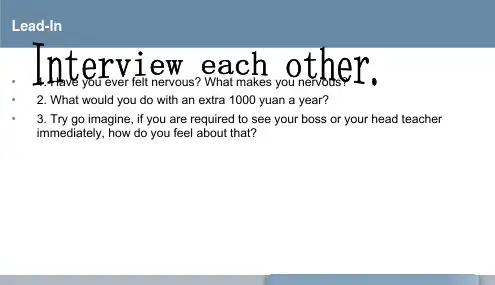
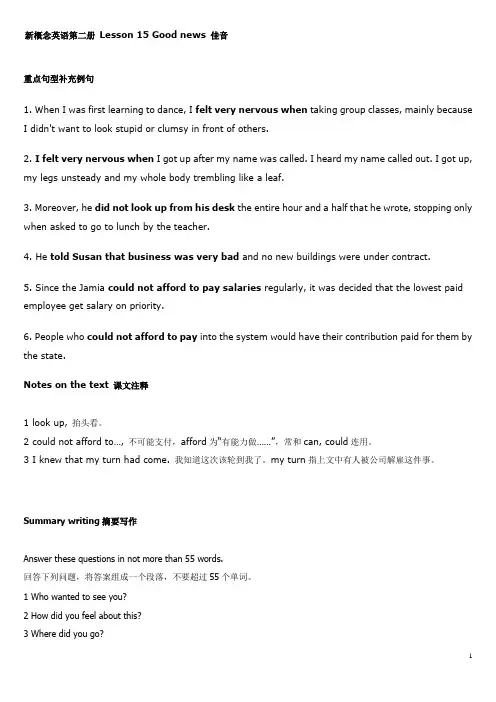
新概念英语第二册Lesson 15 Good news 佳音重点句型补充例句1. When I was first learning to dance, I felt very nervous when taking group classes, mainly becauseI didn't want to look stupid or clumsy in front of others.2. I felt very nervous when I got up after my name was called. I heard my name called out. I got up, my legs unsteady and my whole body trembling like a leaf.3. Moreover, he did not look up from his desk the entire hour and a half that he wrote, stopping only when asked to go to lunch by the teacher.4. He told Susan that business was very bad and no new buildings were under contract.5. Since the Jamia could not afford to pay salaries regularly, it was decided that the lowest paid employee get salary on priority.6. People who could not afford to pay into the system would have their contribution paid for them by the state.Notes on the text 课文注释1 look up, 抬头看。
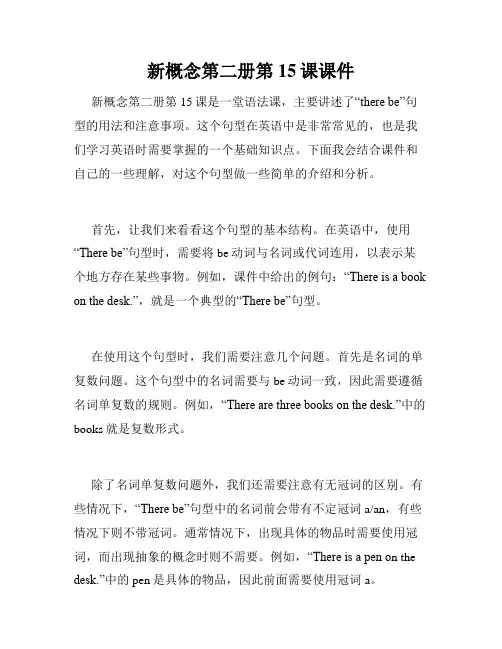
新概念第二册第15课课件新概念第二册第15课是一堂语法课,主要讲述了“there be”句型的用法和注意事项。
这个句型在英语中是非常常见的,也是我们学习英语时需要掌握的一个基础知识点。
下面我会结合课件和自己的一些理解,对这个句型做一些简单的介绍和分析。
首先,让我们来看看这个句型的基本结构。
在英语中,使用“There be”句型时,需要将be动词与名词或代词连用,以表示某个地方存在某些事物。
例如,课件中给出的例句:“There is a book on the desk.”,就是一个典型的“There be”句型。
在使用这个句型时,我们需要注意几个问题。
首先是名词的单复数问题。
这个句型中的名词需要与be动词一致,因此需要遵循名词单复数的规则。
例如,“There are three books on the desk.”中的books就是复数形式。
除了名词单复数问题外,我们还需要注意有无冠词的区别。
有些情况下,“There be”句型中的名词前会带有不定冠词a/an,有些情况下则不带冠词。
通常情况下,出现具体的物品时需要使用冠词,而出现抽象的概念时则不需要。
例如,“There is a pen o n the desk.”中的pen是具体的物品,因此前面需要使用冠词a。
此外,我们还需要注意这个句型的否定和疑问形式。
在否定形式中,需要在be动词之后加上not,例如“There is not a book onthe desk.”;而在疑问形式中,则需要将be动词和主语颠倒,例如“Is there a book on the desk?”。
除了这些注意事项之外,我们还可以在实际运用中提高这个句型的使用效果。
例如,在描述某一个地点时,可以使用“There be”句型来介绍这个地方所包含的事物或设施。
在写作或演讲中,也可以利用这个句型来引入主题或话题,让听众更好地理解和关注。
综上所述,新概念第二册第15课所介绍的“There be”句型是英语中非常重要的基础语法之一。
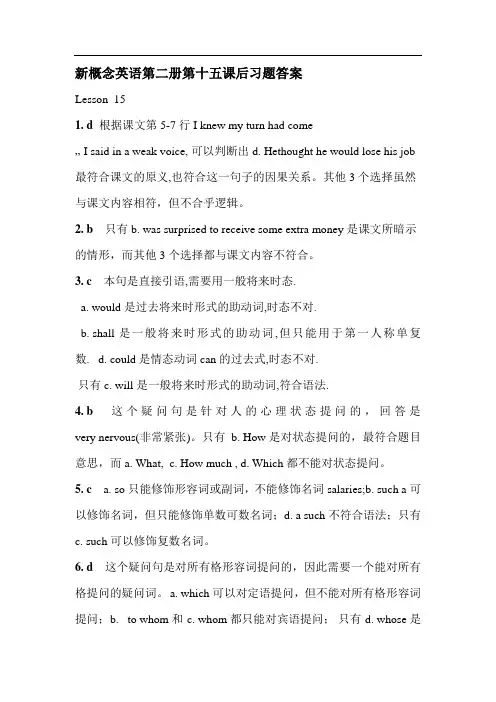
新概念英语第二册第十五课后习题答案Lesson 151. d根据课文第5-7行I knew my turn had come… I said in a weak voice, 可以判断出d. Hethought he would lose his job 最符合课文的原义,也符合这一句子的因果关系。
其他3个选择虽然与课文内容相符,但不合乎逻辑。
2. b只有b. was surprised to receive some extra money是课文所暗示的情形,而其他3个选择都与课文内容不符合。
3. c本句是直接引语,需要用一般将来时态.a. would 是过去将来时形式的助动词,时态不对.b. shall 是一般将来时形式的助动词,但只能用于第一人称单复数. d. could 是情态动词can 的过去式,时态不对.只有c. will 是一般将来时形式的助动词,符合语法.4. b这个疑问句是针对人的心理状态提问的,回答是very nervous(非常紧张)。
只有b. How 是对状态提问的,最符合题目意思,而a. What, c. How much , d. Which 都不能对状态提问。
5. c a. so 只能修饰形容词或副词,不能修饰名词salaries;b. such a 可以修饰名词,但只能修饰单数可数名词;d. a such 不符合语法;只有c. such 可以修饰复数名词。
6. d这个疑问句是对所有格形容词提问的,因此需要一个能对所有格提问的疑问词。
a. which 可以对定语提问,但不能对所有格形容词提问;b. to whom 和c. whom 都只能对宾语提问;只有d. whose 是对所有格形容词提问的,所以应该选d.7. a 只有a. in 才能同后面的名词a weak voice 构成一个表示方式的短语,意思是“用微弱的嗓音说话”而其他3个选择都不能跟 aweak voice 构成符合习惯用法的短语。


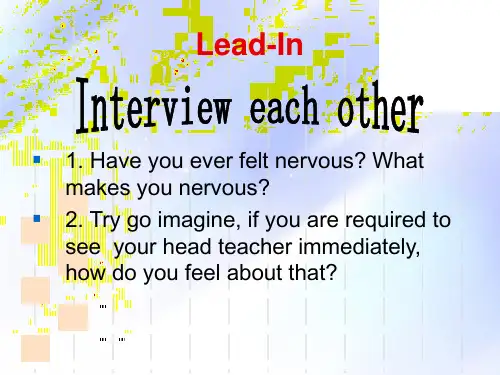

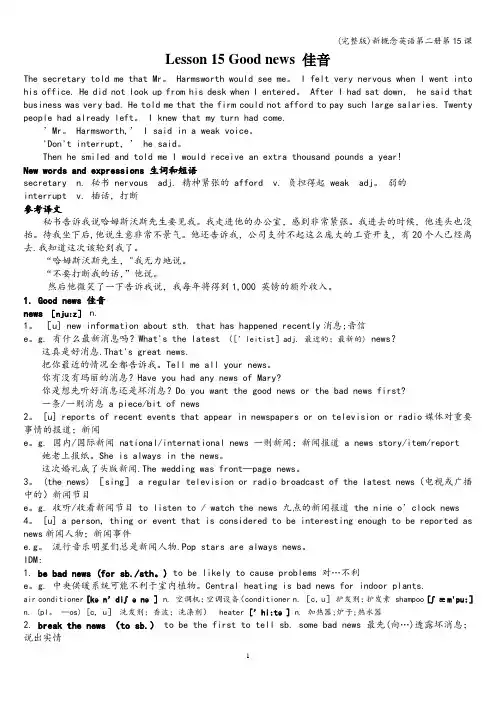
Lesson 15 Good news 佳音The secretary told me that Mr。
Harmsworth would see me。
I felt very nervous when I went into his office. He did not look up from his desk when I entered。
After I had sat down, he said that business was very bad. He told me that the firm could not afford to pay such large salaries. Twenty people had already left。
I knew that my turn had come.’Mr。
Harmsworth,’ I said in a weak voice。
'Don't interrupt,’ he said。
Then he smiled and told me I would receive an extra thousand pounds a year!New words and expressions 生词和短语secretary n. 秘书 nervous adj. 精神紧张的 afford v. 负担得起 weak adj。
弱的interrupt v. 插话,打断参考译文秘书告诉我说哈姆斯沃斯先生要见我。
我走进他的办公室,感到非常紧张。
我进去的时候,他连头也没抬。
待我坐下后,他说生意非常不景气。
他还告诉我,公司支付不起这么庞大的工资开支,有20个人已经离去.我知道这次该轮到我了。
“哈姆斯沃斯先生,"我无力地说。
“不要打断我的话,”他说。
然后他微笑了一下告诉我说,我每年将得到1,000 英镑的额外收入。
1. Good news 佳音news [nju:z]n.1。

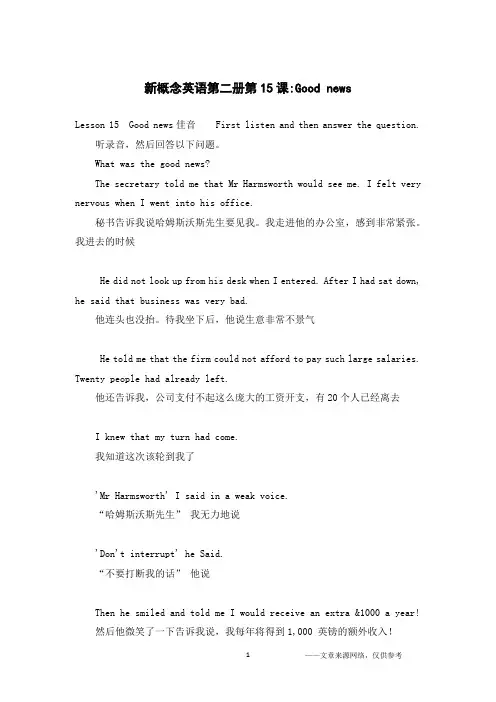
新概念英语第二册第15课:Good newsLesson 15 Good news佳音First listen and then answer the question.听录音,然后回答以下问题。
What was the good news?The secretary told me that Mr Harmsworth would see me. I felt very nervous when I went into his office.秘书告诉我说哈姆斯沃斯先生要见我。
我走进他的办公室,感到非常紧张。
我进去的时候He did not look up from his desk when I entered. After I had sat down, he said that business was very bad.他连头也没抬。
待我坐下后,他说生意非常不景气He told me that the firm could not afford to pay such large salaries. Twenty people had already left.他还告诉我,公司支付不起这么庞大的工资开支,有20个人已经离去I knew that my turn had come.我知道这次该轮到我了'Mr Harmsworth' I said in a weak voice.“哈姆斯沃斯先生”我无力地说'Don't interrupt' he Said.“不要打断我的话”他说Then he smiled and told me I would receive an extra &1000 a year!然后他微笑了一下告诉我说,我每年将得到1,000 英镑的额外收入!New words and expressions 生词和短语secretaryn. 秘书nervousadj. 精神紧张的affordv. 负担得起weakadj. 弱的interruptv. 插话,打断Notes on the text课文注释1 look up,抬头看。
新概念英语第二册Lesson15课件一、教学内容1. 单词:包括flat, road, house, hospital, school等;2. 短语:go to, live in, near to等;3. 句型:描述地点和方向的句子,如“Where does he live?”, “He lives in a flat near the hospital.”等。
二、教学目标1. 学生能够听懂、会说、会读本节课所学的单词和短语;2. 学生能够运用所学句型描述地点和方向;3. 学生能够通过情景对话,运用所学知识进行实际交流。
三、教学难点与重点重点:单词和短语的正确发音及用法;句型的掌握和运用。
难点:flat, hospital等单词的准确发音;描述地点和方向的句子结构的运用。
四、教具与学具准备教具:PPT课件、单词卡片、情景对话卡片;学具:课本、练习本、文具。
五、教学过程1. 情景引入:教师通过展示一幅地图,引导学生观察并描述地图上的地点和方向。
2. 新课内容展示:教师利用PPT课件,展示本节课所学单词和短语,并进行讲解和示范。
3. 单词和短语练习:教师引导学生跟读单词和短语,并进行口语练习。
4. 句型学习:教师通过例句,讲解和示范本节课所学的句型,并引导学生进行口语练习。
5. 情景对话:教师展示情景对话卡片,引导学生进行角色扮演,实际运用所学知识进行交流。
6. 课堂巩固:教师布置随堂练习,检查学生对单词、短语和句型的掌握情况。
六、板书设计板书内容:本节课所学单词和短语,以及句型。
七、作业设计1. 单词和短语抄写:要求学生抄写本节课所学的单词和短语,并正确书写。
2. 句型练习:要求学生运用所学句型,描述自己家附近的地点和方向。
3. 情景对话:要求学生分组进行角色扮演,实际运用所学知识进行交流。
八、课后反思及拓展延伸2. 拓展延伸:教师可以布置一些拓展性作业,如让学生绘制自己家附近的地图,并用英语标注地点和方向。
新概念英语第二册第十五课作文英文回答:The concept of time is an abstract and complex dimension that has intrigued philosophers, scientists, and artists for centuries. It is an essential element of our reality that governs our experiences and perceptions of the world around us. Time, like space, has been a fundamental topic in philosophical inquiry.In the 15th lesson of New Concept English, we explore the theme of time through the lens of various perspectives and experiences. We reflect on the subjective nature of time, its relationship to memory and change, and its impact on our lives.The passage begins by presenting the concept of time as a "river of events" that flows continuously and irreversibly. It's a metaphor that captures the dynamic and relentless nature of time, reminding us that we areconstantly moving forward, leaving behind the past and embracing the future.The lesson then delves into the subjective perceptionof time, highlighting that our experiences can influence how we perceive its passage. Time can seem to stretch or compress, depending on our emotional state or theactivities we are engaged in. This subjective nature oftime was famously captured by Albert Einstein in his theory of relativity, which showed that time is not absolute but relative to the observer.Memory plays a crucial role in our understanding of time. Our memories allow us to remember past events, relive them in our minds, and connect them to the present. However, memories can also be selective and distorted, shaping our perception of the past and potentially influencing our view of the future.Time is closely intertwined with the concept of change. As time passes, things change around us and within us. Changes can be gradual or abrupt, positive or negative, butthey are an inevitable part of life. The lesson encourages us to embrace change and to find opportunities for growth and renewal within its cycles.The impact of time on our lives is multifaceted. It influences our physical, emotional, and psychological well-being. As we grow older, our bodies change, our minds mature, and our perspectives on life evolve. Time can be both a source of joy and sorrow, offering us newexperiences and opportunities but also reminding us of loss and the transience of life.In conclusion, the concept of time is vast and multifaceted, encompassing both objective and subjective dimensions. It is a river of events that flows continuously, a subjective experience that can be shaped by our memories and emotions, and a force that brings both change and continuity to our lives. As we navigate the complexities of time, it is important to appreciate its profound influence on our experiences and to find ways to live in harmony with its rhythms.中文回答:时间是一个抽象而复杂的概念,几个世纪以来一直让哲学家、科学家和艺术家着迷不已。
【导语】新概念英语⽂章短⼩精悍,语句幽默诙谐,语法全⾯系统。
适合各个阶层的⼈群学习参考。
相信有了新概念英语,你也可以成为“⼤神”级别的⼈物!还在等什么?快来加⼊学习吧!⼩编与您⼀起学习进步! 新概念英语第⼆册第15课词汇学习 Word study nervous adj. (1)神经质的,神经紧张的: She is a nervous woman. Do you see that nervous smile on her face? 她是个神经质的⼥⼈。
你看见她脸上那种神经质的微笑了吗? (2)紧张的,担⼼的,情绪不安的: I feel very nervous before exams. 我在考试前感到⾮常紧张。
He had never spoken in public, so he was very nervous. 他从未当众讲过话,因此他⾮常紧张。
(3)与nervous容易混淆的另⼀个词是 irritable(易怒的,急躁的): Our teacher is an irritable old lady. She gets angry easily. 我们的⽼师是位脾⽓急躁的⽼太太。
她很容易⽣⽓。
afford vt. (1)买得起(常与can连⽤): We can/can't afford a car this year. 我们今年买得起/买不起⼩汽车。
(2)担负得起(损失、后果等),花得起(时间)(常与can连⽤): I can't afford to be ill again. 我不能再病了。
I can only afford one week for the trip. 我只能为这次旅⾏抽出⼀周的时间。
(3)提供,给予: Joe afforded us a room for the night. 那天晚上乔为我们提供了⼀个房间过夜。
新概念英语第⼆册第15课练习答案 Key to written exercises 1.关键句型练习答案 A 1a The secretary told me that Mr. Harmsworth would see me. b'Mr. Harmsworth will see you. ' 2 a Mr. Harmsworth said that business was very bad. b 'Business is very bad.' 3 a Mr. Harmsworth told me that the firm could not afford to pay such large salaries. b 'The firm cannot afford to pay such large salaries. ' B 1 told… would come/would be coming 2 said…(had) cut 3 told… had never played 4 did he say…had done/would do 5 did he tell…(had) bought/would buy 6 said…could not 7 said…(had) worked 8 told…wrote/writes/had never written 9 did you say…were/had been 10 said…would wait 2.难点练习答案1 study2 office3 nervous4 afford5 irritable 3.多项选择题答案 1d 2b 3c 4b 5c 6d 7a 8d 9c 10c 11c 12b。